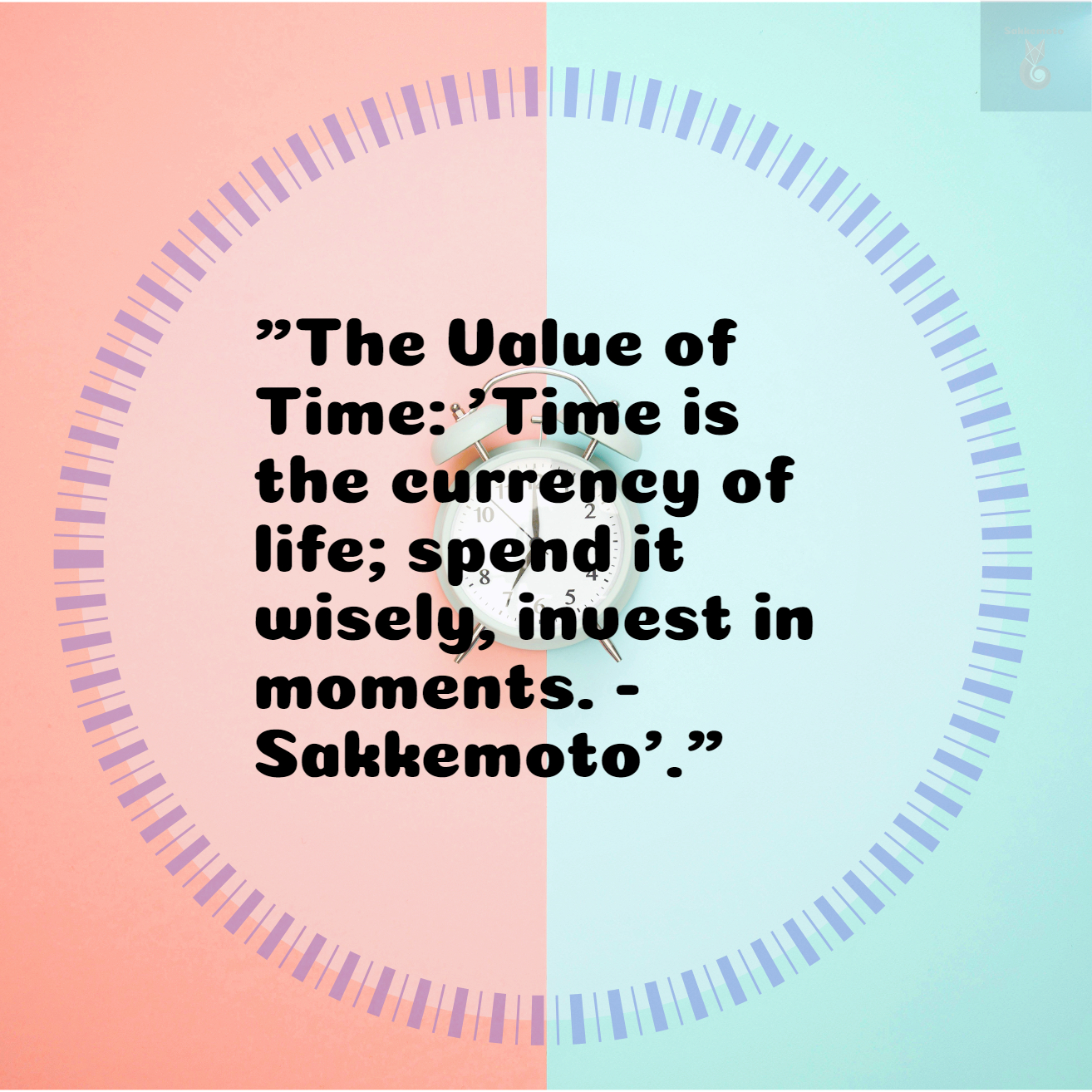Page Contents
- 1. Understanding the Time Value of Money in Financial Management
- 2. The Link Between Effective Time Management and Personal Productivity
- 3. The Psychological Impact of a Healthy Time Perspective
- 4. Leveraging Time as a Strategic Advantage in Career Development
- 5. Time Management: A Key Skill for Effective Leadership
- Embracing a Mindset of Time Abundance
- blog
Tick-tock, tick-tock. Time – an abstract concept yet an absolute reality dictating our lives. Among the many things that bind us as humans, time stands as the most intrinsic and elusive. We often hear phrases like ‘time flies’, ‘time is money’, or ‘there’s no time like the present’. But why does time hold such value, and how does it impact our lives?
The value of time is not simply about minutes and hours; it permeates every facet of life. From making financial decisions to managing personal productivity, from shaping our mental well-being to steering career growth and leadership, a deeper understanding of the importance of time can serve as a transformative tool.
On this journey through the chronicles of time, we’ll unravel its significance across different spheres. A key takeaway for each reader: knowledge about the value of time can instill a fresh perspective, catalyze personal growth, and ultimately transform your life. Let’s embark on this exploration together – after all, there’s no time like now!
1. Understanding the Time Value of Money in Financial Management
When it comes to financial management, understanding the time value of money (TVM) is crucial. This concept tells us that a dollar today is worth more than a dollar in the future. Why? Because if we have that dollar today, we can invest it and make it grow over time.
How TVM Works
To grasp the concept better, let’s look at two important aspects of TVM:
- Present Value: This is the current value of a future sum of money, based on a specific interest rate. It helps us answer the question: “What is the value today of a dollar I will receive in the future?”
- Future Value: On the other hand, future value helps us determine how much an investment made today will be worth at a future date, assuming a certain interest rate.
The Importance in Business Finance
Incorporating TVM into business finance decisions is essential for several reasons:
- It allows us to compare different investment opportunities or capital projects on an equal footing.
- By bringing all future cash flows back to their present value, we can make better decisions about where to allocate our resources.
- It helps us consider the time factor and understand that money has potential earning power when invested wisely.
Applying TVM Principles
One common technique used in financial analysis is called discounted cash flow (DCF) analysis. This method helps us forecast and discount expected cash flows back to their present value, taking into account the time value of money. With DCF analysis, we can:
- Estimate the future cash flows we expect to receive from an investment.
- Determine an appropriate discount rate based on factors like risk and opportunity cost.
- Calculate the present value of those cash flows using the discount rate.
- Compare the present value to the initial investment to see if it’s a good opportunity.
By using TVM principles and tools like DCF analysis, investors and business managers can make more informed decisions about where to allocate their resources for maximum profitability and strategic advantage.”
2. The Link Between Effective Time Management and Personal Productivity
Time management and productivity – two buzzwords that echo in the corridors of personal and professional development. Yet, what binds these two concepts together? Let’s delve into it.
Imagine a day in your life as a giant jar. Every task you perform is a stone that fills up this jar. Now, the catch is, the jar never grows bigger, but the stones can get smaller. This is where time management shines! By managing your time effectively, you essentially break down larger tasks (or stones) into smaller, manageable ones.

The Role of Prioritization
Prioritization is your pickaxe in this scenario. Not every task is equally important or urgent. If you’re juggling multiple tasks, identify the ones that are crucial to achieving your goals. These are your big rocks that need to be tackled first.
The Power of Goal Setting
Next up, goal setting. It’s almost like setting up signboards on a long journey. Each goal achieved is a milestone crossed, keeping you motivated and on track.
The Impact of Eliminating Distractions
Last but not least, we have eliminating distractions. In our analogy, these distractions are like pebbles that take up space but don’t contribute to filling up the jar. By filtering out unnecessary tasks or distractions, you make room for what truly matters.
Thus, aligning time management with personal productivity isn’t just about doing more in less time but about making mindful decisions on what’s worth spending your time on. Remember to prioritize, set achievable goals and eliminate distractions – your keys to unlock the full potential of productivity.
3. The Psychological Impact of a Healthy Time Perspective
The way we perceive time can have a significant impact on our well-being. According to Zimbardo and Boyd’s Time Perspective Theory, our individual experiences shape how we see the passage of time. This, in turn, affects our thoughts, feelings, and behaviors.
How Our Perception of Time Affects Us
- Living in the past: Spending too much time dwelling on past events can lead to regret or longing for what once was.
- Focusing on the future: Being overly concerned about what’s to come can create anxiety or fear about what may happen.
- Embracing the present: Finding a balance between reflecting on the past, planning for the future, and being fully present in the here and now can promote psychological well-being.
The Benefits of Mindful Living
One way to cultivate a healthier relationship with time is through mindful living. This practice encourages us to be fully engaged in each moment without judgment. By doing so, we can:
- Experience life more deeply
- Reduce stress and anxiety
- Improve our overall mental health
The Importance of Work-Life Balance
Finding a balance between work and leisure is another crucial aspect of managing our time effectively. Taking regular breaks to relax or participate in activities we enjoy not only helps us recharge but also enhances our productivity when we return to work.
“Time isn’t the main thing. It’s the only thing.” – Miles Davis
Remember that time is a valuable resource that should be used wisely. By developing a healthy time perspective, we can better take care of our mental well-being.
4. Leveraging Time as a Strategic Advantage in Career Development
Recognize time as a resource just like any asset on a balance sheet. When you start treating time with the same respect you give to your finances, doors swing open to career advancement and personal growth. Here’s how valuing your precious minutes can be a game-changer:
Prioritize High-Impact Work
Identify projects that not only resonate with your career goals but also have the potential to create substantial impact. By focusing on these high-value tasks, you enhance your visibility and establish yourself as a key player in your field.
Build a Flexible Career Path
Flexibility is the new currency in the job market. A flexible career doesn’t just mean choosing when and where you work; it also implies being adaptable in taking on roles or projects that align with emerging trends and personal aspirations.
Calculate Your True Hourly Rate
Understand the worth of each hour by calculating what your time is truly worth — beyond just your salary. This includes considering the value of personal development, networking, and even downtime.
Smart Delegation
With your true hourly rate in mind, decide which tasks are below your pay grade. Then delegate or outsource them. This strategic move frees up time for more valuable endeavors that can accelerate your career progression.
Key takeaway: To climb the ladder, don’t just work hard—work smart. Pinpointing the value of every hour empowers you to make decisions that propel your career forward while ensuring that none of your precious time goes to waste.
By incorporating these principles into daily routines, professionals carve out a niche for themselves as savvy time managers who know how to leverage their most limited resource for maximum gain.
5. Time Management: A Key Skill for Effective Leadership
In the realm of leadership, time management carries weight beyond a mere productivity tool. It acts as a catalyst for better decision making, fostering an environment where goals are not only set but achieved.
The Importance of Gathering Timely Feedback
Consider the importance of gathering timely feedback. A leader who values time understands that feedback is a gold mine of insights and opportunities for improvement. By eliciting feedback promptly, they can identify areas of concern, implement changes, and measure results — all in a timely manner.
For instance, let’s take the example of a product development team working on a new software release. Gathering feedback throughout the project lifecycle, instead of waiting until the end, allows the team to make necessary adjustments on the fly. This saves both time and resources while improving the final product.
Understanding Long-Term Consequences
Now cast your thoughts towards long-term consequences. Leaders who appreciate time are adept at understanding its ripple effects — how decisions made today will affect tomorrow. They recognize that short-term gains may lead to long-term losses if not evaluated carefully.

Taking an example from business strategy, imagine a company deciding between investing in market research for future products or boosting current sales with marketing campaigns. A leader with effective time management skills will weigh the long-term benefits of understanding customer needs against immediate sales growth.
The Power of Delegation
The takeaway? Leaders need to prioritize their time effectively and delegate tasks. Not every task requires their direct involvement; delegation is a powerful tool that frees up leaders’ time for strategic thinking.
Remember:
- Prioritize tasks based on their impact and urgency
- Delegate appropriately to empower your team
- Make informed decisions considering both immediate needs and future implications
These principles, when applied consistently, ensure progress towards strategic objectives while maintaining balance and productivity within the team.
Embracing a Mindset of Time Abundance
Value your time like it’s a treasure chest overflowing with minutes.
The bulk of our discussions revolved around the importance of respecting time. An important shift involves moving from a scarcity mentality—”there’s not enough time!”—to an abundance mindset—”time is plentiful if used wisely”.
Think about it. The scarcity mindset leaves you feeling rushed, anxious, and unfulfilled, constantly chasing the clock. On the contrary, an abundance mindset helps you feel calm, focused, and in control. You’ll start to see that there’s enough time for things that truly matter.
To do list or not to do list? That’s not the question.
The question is how to maximize your value of time. Remember these key principles:
- Prioritize what’s most important.
- Use financial concepts like DCF for making smart decisions.
- Cultivate a healthy relationship with time.
- Leverage time as a strategic advantage.
- Enhance leadership skills through effective time management.
Implement these principles and observe how they transform your life.
Action speaks louder than words.
Now is the perfect moment to make a change. Embrace this new perspective on time. Take action, implement these principles in your daily life and experience a positive transformation. Remember, every second counts!
blog
financial freedom management self improvement time time management
Last modified: 9 February 2024












It’s said that there are people who have time but no money, then there are those people who have money but no time. In this era of the new rich, it’s advisable to start businesses and investments to free up your time so that you have money and time at the end of time
Absolutely, Naftali! The relationship between time and money is crucial, and achieving a balance is often a key factor in leading a fulfilling life. Starting businesses and investments can indeed be a strategic way to build wealth and, at the same time, create more time for yourself. This approach aligns with the concept of creating passive income streams that can generate money without requiring constant active involvement.
If you have any specific questions or if there’s anything else you’d like to discuss, feel free to let me know!
Hi my family member I want to say that this post is awesome nice written and come with approximately all significant infos I would like to peer extra posts like this
Thank you, Kali! Thrilled to hear you enjoyed ‘The Value of Time.’ Stay tuned for more insightful posts! – Kali Grant
Fantastic site. A lot of helpful info here. I’m sending it to some buddies ans additionally sharing in delicious. And naturally, thanks on your sweat!
“Appreciate the support, Jill! Delighted to hear you found value. Sharing insights and gratitude for your time! – Jill Wilkins”
I do not even know how I ended up here but I thought this post was great I dont know who you are but definitely youre going to a famous blogger if you arent already Cheers
Thank you, Otha! Thrilled you enjoyed ‘The Value of Time.’ Your encouragement means a lot. Cheers to the journey! – Otha Waters
Every visit to your blog feels like attending a party of positivity. Thank you for the festive atmosphere!
“Thank you, Brasil Direto! Your kind words light up the blog party. Grateful to have you in our positive atmosphere! – Brasil Direto”
you are truly a just right webmaster The site loading speed is incredible It kind of feels that youre doing any distinctive trick In addition The contents are masterwork you have done a great activity in this matter
Thank you for the kind words! I’m delighted to hear that you enjoyed “The Value of Time” and appreciate the site’s loading speed. Creating valuable content is a priority, and I’m glad you found it to be a masterwork. If you have any more feedback or if there’s anything specific you’d like to explore further, feel free to let me know!
I have been surfing online more than 3 hours today yet I never found any interesting article like yours It is pretty worth enough for me In my opinion if all web owners and bloggers made good content as you did the web will be much more useful than ever before
Thank you, Aiyana Schamberger! Your kind words are truly appreciated. I’m thrilled to hear you found value in ‘The Value of Time.’ Creating useful and interesting content is a priority, and I’m grateful for your positive feedback. – Aiyana Schamberger